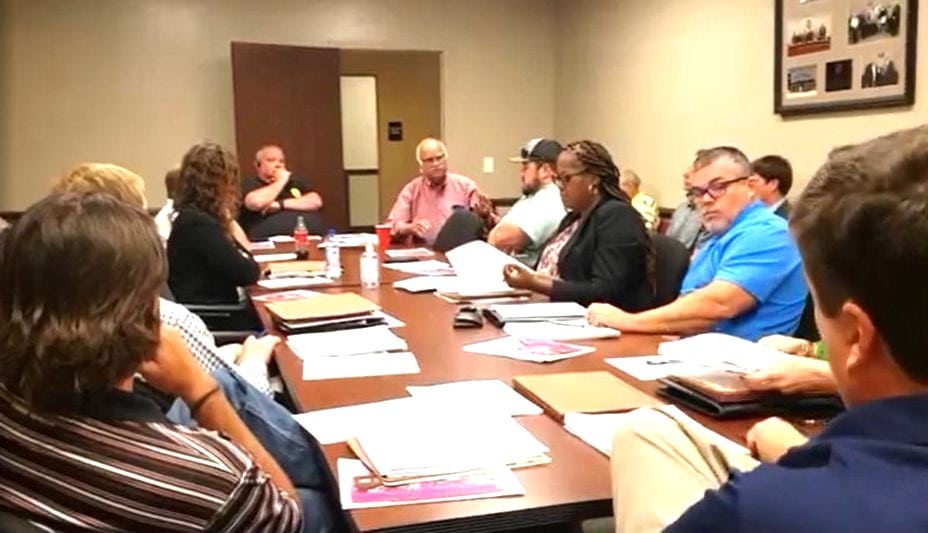BY SARAH STEPHENS
ELMORE/AUTAUGA NEWS
Top Photo: Millbrook Council members at their original work session to discuss raising city sales tax.
This morning, the City of Millbrook held a special-called meeting and voted to raise the city’s sales tax by one percent. The meeting was called in an effort to get the measure voted on before Governor Kay Ivey signs House Bill 479 into law, which will cap sales tax for cities and towns in Alabama at their current level prior to the new law being finalized.
Historically, Millbrook has maintained the lowest sales tax in the river region, and this is the first time in 31 years the city has voted to increase sales tax.
In essence, if the city doesn’t try to get the most sales tax possible now, they will forever remain at the current level.
All councilmen present voted in favor of raising the city total sales tax from 8.5 percent to 9.5 percent. Jaquelyn Thomas was out of town and unable to attend the special called meeting.
However, there is a question of whether that vote will hold up, depending on when the governor signs the bill into law, and if lawmakers believe the city had posted their intent to raise the sales tax in time.
Mayor Al Kelley said he never had any intention of raising sales tax, and this is not something he would have chosen to do. However, with House Bill 479 presented in the house last month, two weeks ago the city had its first reading of an ordinance to raise taxes. Originally, the bill’s wording said the new tax reduction by the state would not go into effect until Sept. 1. However, amendments to the bill changed that to say with the governor’s signature it would become law. Wording in the amended bill also made it where cities and towns can never go up on taxes, and they would be capped wherever they stood at the time the law passes.
City officials signed the documents immediately after the vote this morning at 9:03 a.m., and asked the city clerk to email the vote to the Governor’s office.
Following the meeting Mayor Kelley spoke to media about the decision to raise sales taxes.
“If the (Millbrook) grocery tax goes to 4.5 percent for food items, which is what we are hoping, it will generate about $2.2 million for us, which is dearly needed for personnel, equipment, and everything else. If not, the 4.5 percent will still be on hardware, and other items, but certain food items will remain at 3.5 percent. That will cut that down by about $500,000. We will still get what we get now, but we will not get anymore on those particular items,” Kelley said.
Kelley said that the legislature has a right to limit their taxation on food items, but his issue is making a law which caps an individual city’s ability.
“If they want to do it with their money that is fine. But then they start messing with ours. They still have the ability…if that educational trust fund does not meet its goals….they can go back up. But there is no provision that says a city can go back up. And that is permanent cap. The legislature is continuing to mess with cities.”
Mayor Kelley admitted there is a possibility this attempt to raise the taxes may “not fly….but we were under the gun. We have to try.”
In a worst case scenario, should Millbrook’s attempt to raise food taxes to the level of other surrounding communities fail, there is one bright spot. Millbrook would remain among the lowest sales tax in the River Region, and officials hope that would be recognized by shoppers. If their efforts are successful, it would make Millbrook equal to, or even still below, some area communities in regards to sales tax.
When we first reported this issue two weeks ago, Mayor Kelley reflected over the years where the city was committed to keeping sales tax lower than surrounding communities.
“(The late) Fred Watts and I always looked at our low sales tax as a benefit, saying that we would only raise it if absolutely necessary,” Kelley told the EAN.
Prattville is at 9.5%, Wetumpka is at 9%, Montgomery is at 10% and Tallassee is at 10%. The Millbrook sales tax was last raised in 1992 – 31 years ago by a prior administration.
Kelley said Millbrook is in very sound financial shape. However, he sees things changing as the area continues to grow and this is bringing additional costs. He said equipment costs have risen dramatically – lawn mowers were $9,000, now the cost is $12,000; trucks were priced at $26,000, now the cost is $36,000.
“This is only a small example of how our city is being affected by inflation, as are our citizens,” Kelley said.
“Our employee starting salaries are below average. We need to raise our starting pay to hire qualified employees and provide for their long-term employment. We need more people in each department with better and newer equipment to do the job that our citizens deserve. With increased manpower, we can continue to provide the services you deserve. Unfortunately, we are losing employees because they are offered higher paying jobs elsewhere.
“We want the citizens of Millbrook, to have the best of every service that a city can provide. That costs money. We have a great quality of life and are in terrific financial condition, but this cannot be sustained if not properly funded,” he said.
Many of the funding streams for the City of Millbrook are controlled by State and/or County mandates. Millbrook sales tax revenue represents over 56% of the total city budget. It is the one source of income for a city that makes a tremendous difference in the availability of funds for services for citizens, equipment needs for all departments and employee retention policies.
“An increase in our sales tax rate is not what we wanted to do, it is more of what we have to do at this time,” Kelley said.
OVERVIEW OF HB479
Amended HB479 by Rep. Danny Garrett passed both the house and the senate. It begins reducing the state sales and use tax on food upon the governor’s signature, with future rate reductions contingent upon certain growth requirements in the Education Trust Fund until the rate is 2%. The bill defines food as items on the Special Supplemental Nutrition Assistance Program (SNAP).
Additionally, HB479 caps local sales tax on food at the time of the governor’s signature and would prevent any future increases on sales tax for food.






